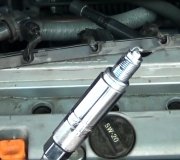The dash gauge is completely irrelevant to this problem. The dash gauge and the Engine Computer use different coolant temperature sensors. The one for the gauge usually uses one wire, and is notoriously inaccurate. Two perfectly fine sensors can give two different gauge readings. As the car owner, you become familiar with what "normal" is. I have two identical late '80s Grand Caravans. One temperature gauge reads 1/4 scale and the other reads over half scale. That one heats very nicely, but the one with the lower gauge reading can burn me out of the vehicle on a cold winter day.
To argue against my point, on some models now they're using the information from the Engine Computer to run the dash gauges, so you may not have a separate temperature sensor for the gauge. The problem there is an actual temperature of between lets say 180 to 220 degrees can be considered normal, and the gauge reading will reflect that. That means the temperature would have to be REALLY low before you saw that on the gauge.
It's the sensors for the Engine Computer that are very accurate. In addition, the computer will learn the characteristics of those by comparing its readings to other sensor readings and operating conditions. You need a scanner to view live data to see what that sensor is showing. Normal is around 200 degrees. Don't concern yourself with a reading ten degrees hotter or colder. That's not enough to cause poor fuel mileage. If the thermostat is stuck open, you'll find a coolant temperature of around 160 degrees.
I forgot to mention earlier about the oxygen sensors. They get falsely blamed a lot for poor fuel mileage but in reality the computer can only add or subtract fuel up to ten percent beyond the pre-programmed values based on the O2 senors' readings. O2 sensors have to get to at least 600 degrees before their readings are accurate. They have heaters in them to prevent them from cooling down during prolonged idling. Also, every aspect of those sensors are monitored by the Engine Computer so if you had an O2 problem, you'd have a related fault code and the Check Engine light would be on. With the absence of a Check Engine light, I'm still leaning toward a mechanical problem that isn't monitored by the computer.
Sunday, August 24th, 2014 AT 12:50 AM



